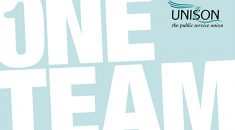UNISON has launched a consultation of health members at the health group conference in Brighton today. Members in England must decide whether to accept a three-year pay deal which comes with an extra £4.2bn worth of funding.
Over a million hospital porters, 999 call handlers, healthcare assistants, nurses, midwives and other health staff across England are being offered long-overdue pay rises, in what would be a major shake-up of the NHS pay structure.
Roz Norman (above), the chair of UNISON’s health service group executive, told delegates at conference that the hard work of activists in the Pay Up Now campaign played a crucial role in forcing pay to the top of the political agenda.
“The consultation has launched today and runs until 5 June – we want everyone to take part,” she said.
“And if the proposals are accepted, the extra funding for English health budgets will go through the Barnett formula into budgets in Scotland, Cymru/Wales and Northern Ireland.
“We can then enter talks in each country about whether and how to implement the agreement in a way that would work for them.”
The Brighton delegates will be debating the pay proposals on Tuesday (17 April).
UNISON led the detailed pay talks with other health unions, employers and the government that have resulted in the current proposals.
The union believes it is a better deal than would be achieved through the pay review vody, and is recommending that members accept it.
If they do so, the proposals would end the 1% pay cap by giving all staff meaningful pay increases.
And they would deliver the essential changes the unions have sought to make Agenda for Change fairer and better for all members.
These include substantial increases to starting salaries, significant pay rises on promotion and faster progression through most pay bands.
The union is writing to all health members, asking them to find out more about the proposals and, when they are ready, cast their vote.
And UNISON head of health Sara Gorton has written to health activists, urging them to help their members in that process.
“I appreciate that this is a complex set of proposals for members to get their heads around, which makes the work of activists so important,” she said.
“The health team will work with them and their regions to ensure that as many members as possible understand these proposals, find out what it means for them, and use their vote to have their say on pay.”
Among the things activists can do include:
- run workplace sessions, meetings and walkabouts;
- host ballot boxes in the branch – using a laptop, mobile phone or any other device connected to the internet and online voting;
- organise recruitment drives – new members can be enrolled onto the voting register provided they are in RMS by 25 May.
The main elements of the pay proposals are:
- a fully-funded break away from the 1% pay cap, so pay rises won’t be paid for through cuts to jobs or services;
- meaningful increases for staff at the top of their pay band – for most this would be worth 6.5% over the three years, plus a lump sum worth 1.1% in year two;
- major increases for staff below the top of the band by deleting pay points and making it quicker to get to the top;
- ending poverty pay through an immediate move to a new, above living wage minimum , with further increases for the lowest-paid staff by the end of the deal;
- improvements to starting salaries to help the NHS attract the new recruits we need to reduce the pressures on existing staff;
- removal of band overlaps to ensure proper pay rises on promotion.
If the proposals are accepted, members will have additional money in their pockets from July.
If they are rejected, UNISON believes the treasury is likely to take the £4.2 billion off the table – leaving unions to wait for the PRB and the government to recommend and implement a pay award.
Members could then be faced with a difficult choice about whether to take industrial action to improve it.
Ms Gorton said: “In an ideal world, the 12%-14% knocked off the real value of NHS pay over the last decade would have been restored for all.
“But the proposal on offer is a negotiated settlement, so was always going to contain a mixture of what UNISON wanted combined with the demands of employers, government and other unions.
“The question for NHS staff is whether there’s enough in the whole package to offer something better than the alternative, which would mean relying on the pay review body to deliver a better award than what’s on offer, and for the government to fund it.
“Getting the funding for these proposals doesn’t mean that we’re going to let ministers off the hook for their record on the NHS,” she added.
“Unions strive to achieve the best deal for members, whichever party is in power, and have worked hard to break the hated pay cap.
“Our aim is to make the whole pay system fairer and the NHS a more attractive place to work for prospective staff. This would help ease the pressure on existing employees struggling to cope with increased demand.
“Also because the offer is funded, staff pay increases won’t come at the expense of jobs and patient care.”
The ballot closes at 5pm on Tuesday 5 June 2018.
Find out more and use our pay calculator to see how your pay would increase.
Make sure you have your say. To cast your vote all you need is your UNISON membership number and date of birth.





